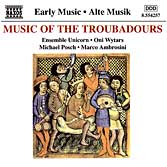 |







|
 |
The music and language of the troubadours, like the
topics they dealt with, have lost none of their signifi-
cance over the course of the centuries. Even today their
influence can be found in the musical and poetic cultures
of southern France and Catalonia, especially in the field
of traditional folk music. In the 12th and 13th centuries,
a troubadour was generally less the travelling singer
than the 19th century would have it. On the contrary,
they were persons of high social standing: kings and
princes, even if they were usually of rather modest
means. Nevertheless, all of them were influenced by
court traditions and conventions and by the courtly
concepts of idealised love with its joys and sorrows.
The language of the troubadours, the langue d'oc, is
Provenšal with related variants. A large number of poems
by the troubadours have been preserved along with a
wealth of monodic music. This is characterised by a
unison melody line that follows the form of the verses
and stanzas in rhythm and structure.
|
 |
PRODUCER:
Michael Posch
ARRANGEMENTS:
Ensemble UNICORN and ONI WYTARS
director: Michael Posch and Marco Ambrosini
RECORDING DATES:
W*A*R Studio;
4. - 6.6.1996
SOUND ENGINEERS:
W*A*R Studio; Elisabeth and Wolfgang Reithofer
MUSIC NOTES:
Keith Anderson

|
 |